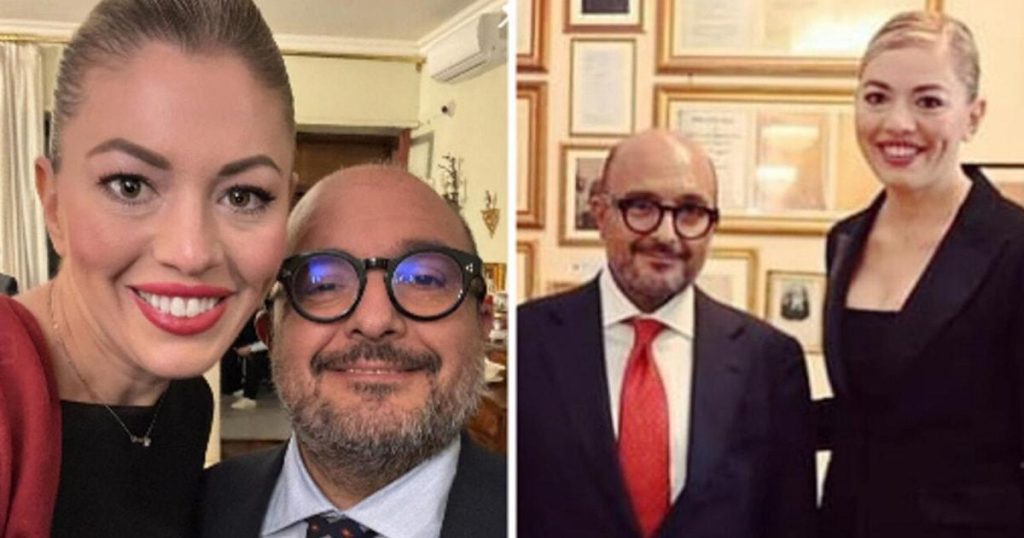Maria Rosaria Boccia granted an exclusive interview to La Stampa to give her version of the case of her failed appointment as a consultant to the Ministry of Culture. This came 24 hours after Gennaro Sangiuliano’s statements to the director of Tg1 Chiocci and a few hours after she herself posted some words on her social media profiles. In the video interview, the businesswoman reiterated, “I have always known that my trips (with the minister) were paid for by the ministry, there are emails confirming it.” She then made an attack saying, “There is someone blackmailing Sangiuliano for the favors they have received.”
Sangiuliano is considering filing a complaint with the public prosecutor about the case involving Boccia. The Ministry released a statement saying, “Tomorrow (Friday) the Minister of Culture, Gennaro Sangiuliano, will meet with his legal team to consider filing a complaint with the Public Prosecutor’s Office.” Before the interview with La Stampa was released, Boccia had already pointed fingers at “other people,” “the power.” Today I am accused of being a blackmailer, but I am not the one who created the blackmail. It is those who occupy the halls of power who exercise it,” she wrote on Instagram about the man with whom the Minister confirmed he had a relationship.
Boccia continued her attack, addressing the criticisms she received, including being called an “influencer, companion, seamstress, someone trying to gain accreditation, boasting, the Anna Delvey of Italian politics, aspirant collaborator, consoler, caregiver, and a cultural love. But who really gossiped: me, him, or ‘the other person,’ exploiting a strategic moment for the country?” This was posted on Instagram by Maria Rosaria Boccia. The reference to blackmail echoed a post she made the previous night during the Minister’s intervention. Sangiuliano emphasized to the Tg1 director that he is “absolutely not blackmailable,” explaining that “you are only if you have used public money.”
In a live TV broadcast, Sangiuliano apologized to his wife for the betrayal, to Giorgia Meloni for the embarrassment caused to her, and to the Government for behavior that was morally disrespectful of his role, and to his colleagues for the superficial way he handled the situation, unwittingly putting them in the non-leading roles of the story. As they awaited Sangiuliano’s interview, Maria Rosaria Boccia prepared in front of the TV with popcorn. Sangiuliano defended himself, reiterating that he is “not blackmailable” because no public money was spent on Boccia’s trips or work, with whom he claims to have had a three-month emotional relationship. When asked why he thought Boccia behaved the way she did, the Minister explained that it could be due to disappointment over a promised but ultimately unfulfilled appointment or feeling betrayed by a woman who felt abandoned.
Following the Minister’s interview, there was criticism from the opposition and a statement from the President of the Oversight Committee, Barbara Floridia. The Democratic Party was the first to speak out, expressing concerns about the Minister’s appearance on state TV instead of addressing the Boccia case in Parliament. There were attacks from almost all opposition parties, with the M5S announcing plans to bring the issue to the Commission. There was also criticism from Italia Viva and calls for the heads of the company to be summoned before the Oversight Committee. Avs highlighted the need for the judicial authorities to clarify the situation.
The Minister also met with Prime Minister Giorgia Meloni at Palazzo Chigi to reaffirm the truth of his statements regarding the case in a letter sent to La Stampa. He clarified that no Ministry funds were used for Boccia’s trips and stays, and she never had access to confidential documents regarding the organization of the G7 Culture. The meeting lasted over an hour and a half and concluded with a statement from the Minister about the case involving his consultant at Viale Trastevere.


